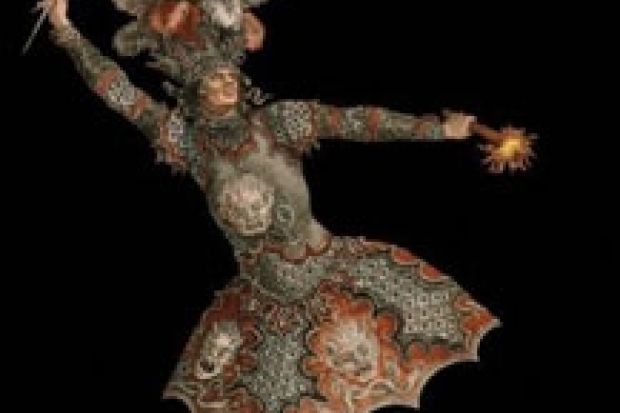Works that span academic disciplines are no rarity these days, but a volume combining early modern French cultural history with the theory of organisations and entrepreneurship must still claim a certain distinction.
A sociologist with a flair for history who teaches in a programme affiliated with a business school, Victoria Johnson offers a unique, insightful and colourful perspective on the French Revolution and the Paris Opera's early history. The historical dimension ultimately emerges as the book's most fully developed and compelling component.
Johnson's study hinges on a paradox and offers a relatively simple - but not obvious - explanation for it. Founded and granted a monopoly under Louis XIV, the Paris Opera rapidly came to represent the pinnacle of opulent courtly show. Yet even as the revolutionaries after 1789 extolled Spartan virtue and simplicity of taste, it was the Paris Opera, almost alone among the symbols of Old Regime luxury, which retained its protected magnificence.
It came under attack for its extravagance both before and during the revolution, but while other bastions of inherited privilege were razed under the bombardment of radical and laissez faire notions of freedom and equality, the Opera shuddered but remained standing.
The revolutionaries stripped it of its monopoly and alternately placed it under municipal or private entrepreneurial control, but they also granted it special subsidies and recognised its singular position on the Parisian, and indeed French and European, cultural scenes.
They could not imagine Paris without the Opera, nor could they imagine the Opera without the impractically posh sets and staging that (more than the mere music and singing) made it the favoured destination of cultural elites both foreign and domestic. The Opera survived not despite its luxury, but because of it.
The reason for these limits to the revolutionary imagination, Johnson argues, cannot be found in the context of the revolution itself, nor in the preceding decades where scholars usually seek the origins of French revolutionary developments.
Instead - and here is where theories of entrepreneurship and "organisational imprinting" become important - she takes readers back to the Opera's founding moments, not just to the early 1670s of Jean-Baptiste Lully's innovative tragedies en musique, but above all to the first holder of the royal privilege, Pierre Perrin, in 1669.
It was Perrin's original version of the Opera, with its unique organisational combination of monopolistic Royal Academy and public theatre, which set the luxuriant pattern for French opera through the rest of the Old Regime and into the revolution itself.
The structure of the book basically follows this story, that is, moving backwards in time from the tribulations and endurance of the revolutionary period in chapters two and three to the origins of French-language opera and the Opera in the 1660s and 1670s (chapters four to six).
Both the chapters on the revolution and those on the early opera are deeply researched and richly contextualised on the basis of scholarly literature and original sources, from dusty administrative documents to pamphlets, newspapers and engravings.
Johnson details with equal relish Lully's jail-cell machinations to wrest control of the Opera from Perrin, the revolt of the artists during the revolution, and the spectacular set designs and special effects that accompanied the singing and dancing. In the end, the work provides a full and persuasive history of the early Paris Opera, for while the foci lie on either end of the chronological span, the gap-bridging chapter on the shifts from Lully to Jean-Phillipe Rameau to Christoph Willibald Gluck, and on the debates over luxury and simplicity in the culture wars of Rousseau's 18th century, proves equally rich and illuminating.
The author suggests that readers can skip the first chapter and the postscript as the more theoretical and sociological portions of the book, and some may wish to do so; those interested in the organisational science aspect will find most in those sections and less in between.
Perhaps surprisingly for a book written by a sociologist, particularly one inspired by Pierre Bourdieu, notions of class, status and social distinction by means of cultural capital and display do not feature prominently. More attention to opera as event, to the role of the audience and performance practice alongside the music itself, as in James Johnson's Listening in Paris or Jennifer Hall-Witt's recent study of the London Opera, could have helped capture more fully the transition from Old Regime to revolution.
Similarly, the reviewer wonders if greater consideration of the Opera within the sphere of public spectacle and festive display more broadly, or as part of the easy conceptual transference of institutions of French cultural glory from the royal domain to the national (as with the Louvre), might also help explain the persistence of courtly forms and opulent display into the era of seeming republican austerity.
As it is, the author's concentration on the behind-the-scenes administration and politicking, and on the visual dimension of the sets and effects themselves, already marks an important complementary contribution to the literature. At once scholarly and for the most part engagingly written, the book could be worth keeping in mind as reading matter the next time one is thinking of "chunnelling" over to Paris to catch a performance of the Opera.
Backstage at the Revolution: How the Royal Paris Opera Survived the End of the Old Regime
By Victoria Johnson
The University of Chicago Press 304pp, £26.50
ISBN 9780226401959
Published 20 January 2009
Register to continue
Why register?
- Registration is free and only takes a moment
- Once registered, you can read 3 articles a month
- Sign up for our newsletter
Subscribe
Or subscribe for unlimited access to:
- Unlimited access to news, views, insights & reviews
- Digital editions
- Digital access to THE’s university and college rankings analysis
Already registered or a current subscriber? Login
